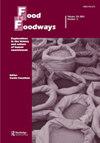哥本哈根饮食学校的品味、教育和共通性
IF 1.1
Q2 ANTHROPOLOGY
引用次数: 0
摘要
本文分析了哥本哈根的饮食学校。与哥本哈根大多数学校的组织方式不同,12所食物学校有现场厨师,让学生准备、烹饪和提供日常膳食。在2016年进行的一项定性研究中,四所食品学校形成了经验基础,其中包括采访学生、食品学校协调员、管理层和厨师。实证数据表明,食物学校需要对市政当局介绍的关于食物教育的一套共同愿景有不同的理解,包括口味、教学和用餐氛围等主题。各种各样的理解和实践使“最佳实践”的概念成为问题,因为它是市政当局统一学校和为新食品学校制定建议的一种方式。相反,文章强调需要解决复杂性,并就如何处理诸如物质性和身体方面的日常实践打开更广阔的视野。只有接受各种各样的表达方式,才能以一种非本质主义的方式来处理和处理食物教育的愿景。本文章由计算机程序翻译,如有差异,请以英文原文为准。
Taste, education, and commensality in Copenhagen food schools
Abstract This article analyses food schools in Copenhagen. Organized differently from the majority of Copenhagen schools, twelve food schools have chefs on site and involve pupils in preparing, cooking, and serving the daily meals. Four food schools formed the empirical basis of a qualitative study conducted in 2016, which involved interviewing pupils, food school coordinators, management, and chefs. The empirical data show that food schools entail differing understandings of a common set of visions introduced by the municipality about food education including topics such as taste, teaching and dining atmosphere. The variety of understandings and practices problematize the notion of “best practice” as a way for a municipality to unify the schools and formulate advice for new food schools. Instead, the article emphasizes the need to address the complexity and to open for a broader view on how to work with situated everyday practices also addressing e.g. materiality and bodily aspects. Only by accepting the variety of expressions, the visions of food education can be addressed and worked with in a non-essentialist manner.
求助全文
通过发布文献求助,成功后即可免费获取论文全文。
去求助
来源期刊

Food and Foodways
ANTHROPOLOGY-
CiteScore
2.20
自引率
0.00%
发文量
16
期刊介绍:
Food and Foodways is a refereed, interdisciplinary, and international journal devoted to publishing original scholarly articles on the history and culture of human nourishment. By reflecting on the role food plays in human relations, this unique journal explores the powerful but often subtle ways in which food has shaped, and shapes, our lives socially, economically, politically, mentally, nutritionally, and morally. Because food is a pervasive social phenomenon, it cannot be approached by any one discipline. We encourage articles that engage dialogue, debate, and exchange across disciplines.
 求助内容:
求助内容: 应助结果提醒方式:
应助结果提醒方式:


